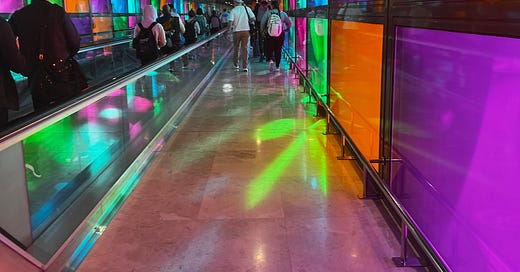I’m writing this piece in the air from Newark to Madrid and could not be more excited to have you along for the experience. The posts from the past month really just serve as the appetizer to the main course — those pieces, in many cases, represented the world in college as I have already understood it, both at Duke and UNC Chapel Hill.
The pieces to come will represent bits and pieces of the fullness of our world, and especially all of its political nuance, as I uncover it in real time — from Spain, to Greece, to Switzerland, over the course of three months.
My ask is that if you have either 1. been enjoying these pieces so far, and/or 2. know anyone who might be interested to read about the topics I’ll enumerate below, I’d really appreciate it if you could share my substack at the link https://andrewsun.substack.com/ (let them know they should subscribe for free!).
I start with a 30-day walking Catholic pilgrimage called the Camino de Santiago, which has been around for around a millennium. My motivation comes from the stories I hope to hear and conversations I hope to have with folks all across the world about religiosity. I am not religious and grew up separated from religion, but I have been attending college in the American South, where religion is much more prominent, and unexpectedly (to me) amongst the Asian American community. I struggle all the time to reconcile the religious rhetoric of politicians I disagree with, with the religious convictions of people around me, which I have come to understand as very reasonable. How does our politics capitalize on the prominence of religion, and how does it perhaps do so in a way that is exploitative? This is my starting question and I can theorize answers; I expect at the end I’ll have better questions to ask (and if I don’t I’m not being a good listener), and I’ll share them on this forum.
I continue with a 15-day stay in Athens, Greece, considered to be the birthplace of western democracy, and a historical hotbed of rhetoricians. What did it look like for society to start formally weaponizing the spoken and written word, and how did norm entrepreneurs in this area push an emphasis on rhetoric and framing into the mainstream? I know, super meta. Expect lots of pictures of museums and monuments.
I finish with a month-long stay in Geneva, Switzerland. So much to explore here regarding political framing in the modern day:
How is death and suffering differentially characterized in Switzerland, in relation to the rest of the EU and especially the United States?
How do the big human rights organizations decide what counts as a human right and what doesn’t?
How does an emphasis on referendums in democracy affect the way in which information, media, and discourse disseminates and propagates? Does it move us closer to political “truths”?
I’m hoping to visit prominent human rights and healthcare organizations and talk to lots of people.
If you happen to know anyone in Athens/Geneva who I could talk to, it would mean the world to me if you let me know :). Really, all of my time this summer is expressly dedicated to learning about these topics and talking to folks who know much more than I do. Or, if you have thoughts for additional topics to explore in these places relevant to political framing (so, practically anything related to politics), comment below!
Thanks for reading this far — so excited to take you along.




